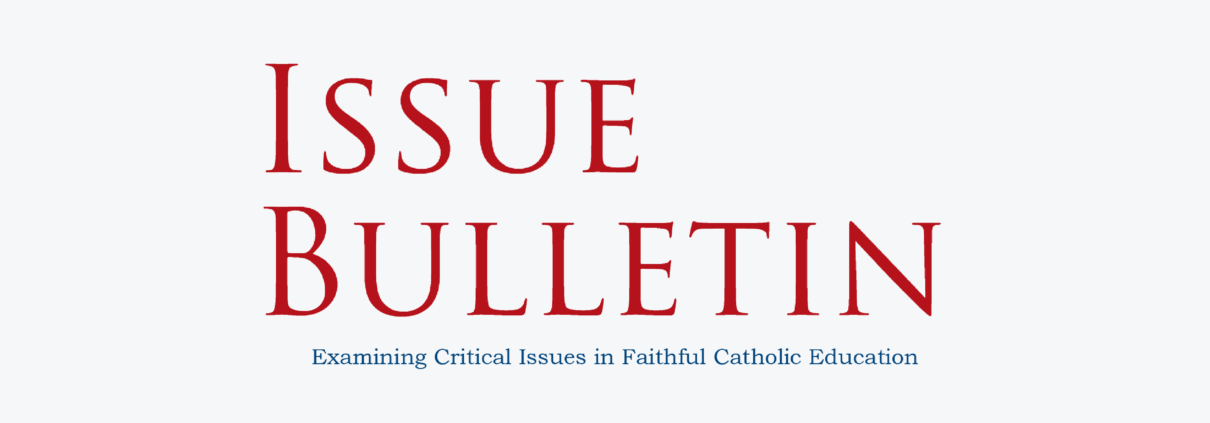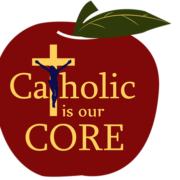Do Catholic Schools Need the Common Core?
The following considerations related to the Common Core were provided to Catholic bishops on November 13, 2013, in Baltimore, Maryland. The Cardinal Newman Society partnered with the National Association of Private Catholic and Independent Schools and the Catholic Education Foundation to present a seminar on the Common Core during the annual meeting of the U.S. Conference of Catholic Bishops.
This publication is part of a series of reports on the Common Core State Standards Initiative and how those standards potentially impact Catholic education.
Our core is the Catholic Faith.
- The core purpose of Catholic education is student formation and nurturing souls.1 These must be the primary standards from which curriculum and teaching methods are developed and schools are assessed.
- Catholic identity is not an add-on; it cannot be reduced to values and traditions to be “infused”2 into secular standards. The standards will determine how and what to teach and how schools are evaluated.
- Catholic schools are successful because of their mission… period. Their emphasis on faith and formation points to classical curricula, good literature, reason and ethics, and individualized attention.
- Mission drives standards; standards drive curriculum and teaching. Our mission and that of government schools are profoundly different, and different missions demand different standards.
- Common Core is explicitly and only “college and career” focused. Our schools are focused on assisting our students to encounter Christ and to pursue truth, beauty and goodness. In the process, they are also well-prepared for college and life beyond.
- Education should prepare students for life, but college and career cannot be the sole or primary objectives for Catholic school standards.3 Educating for secular ends leads to either pride or despair.
- Our standards must inspire, not content with the minimum but pressing forward to- ward the maximum.
Catholic schools are already among the best in the nation.
- On the federal NAEP tests, Catholic schools have significantly outperformed public schools for 20 years. Grade 8 scores in 2013: Reading 286 (public schools 226), Math 295 (public schools 284).4
- In 2011, religious schools far outperformed public schools on the SAT: Reading 531 (public schools 449), Math 533 (public schools 506), Writing 528 (public schools 483).5
- Parents care about Catholic identity, school environment and learning outcomes—in- cluding test scores and high school/college success. But they don’t seek conformity to public school standards.
- Standards influence how and what students learn, but there is no certain correlation between standards and test scores. States with standards rated both “A” and “F” by the Fordham Institute report similar test scores.6
- Catholic schools can excel on nationally normed, non-Common Core tests available for the next several years.7 Afterward, testing companies will be eager to serve our schools’ 2 million students.8
- Avoiding Common Core will highlight Catholic school competitive advantages: choice, freedom, authentic difference, human excellence, Christian faith, proven, successful, safe, outstanding education.
Catholic schools already prepare for college and careers.
- Catholic high schools have a 99% graduation rate (73% public schools), and 85% of Catholic high school graduates attend four-year colleges (44% public schools).9
- Good teaching can ensure success on college entrance exams, even when Common Core-compliant, perhaps with some test preparation. The ACT is not changing signifi- cantly, so scores should be stable.10
Common Core is not required for Catholic schools.
- No government or accreditor requires Catholic schools to adopt Common Core.
- Some states may tie Common Core to funding. The Church should defend religious liberty and school choice without compromising Catholic schools’ autonomy.
- We must lead with confidence; we do not follow in fear or from intimidation. We do not simply “get on board” because others are doing it. Common Core is becoming toxic, and every failure will be laid at our doorstep if we rush into this.
Common Core seeks radical change in education.
- “The Common Core represents a fundamental shift in the teaching and learning process.”11 It proposes to fix broken public schools, but Catholic schools are not broken.
- Common Core embraces theories of exploration learning and constructivism, conflict- ing with the proven method of direct instruction in younger grades.12
- Common Core is largely a privately funded initiative of the morally reprehensible Bill and Melinda Gates Foundation,13 which pays the NCEA to promote Common Core.14
- Common Core advocates reassure parents that the standards “are not a curriculum.”15 That’s a red herring. The standards are intended to drive changes in curriculum, teach- ing and assessment.16
Common Core is untested and experimental.
- Before any intervention, there should be 1) a need and 2) empirical evidence that the need will be satisfied. Common Core offers neither; its standards have never been test- ed.17 They were developed by little-known “experts” with no solid research basis, de- spite misleading claims.18
- Common Core’s proponents—the Gates Foundation, several state governors and school leaders, the Obama administration, and “big business”—have quietly avoided public scrutiny and accountability by working around Congress, state legislatures, and now Catholic school educators and parents.
- Common Core’s emphasis on informational texts depends upon distortions of NAEP data and lacks solid evidence. The 2006 federal Progress in International Reading Literacy Study (PIRLS) found that higher literacy scores correlate to more reading of novels and less frequent reading of information.19
The Common Core standards are flawed.
- Common Core demands greater emphasis on reading informational texts, with a cor- responding decrease in great literature.20 Some recommended (not required) texts are morally problematic.
- Common Core imposes “reform math,” not our traditional and successful math pro- grams. It lowers standards: pre-algebra or algebra is no longer the eighth-grade norm, nor pre-calculus or calculus for 12th grade.21 22
- There is a misalignment with early grade expectations and lack of detail in upper grades.23
- There is a lack of specific content knowledge; too much is simply skills-based.24
Common Core aims for nationalization, not pluralism.
- The Church favors “a plurality of school systems” to “safeguard her objectives in the face of cultural pluralism” and increasing state control of education.25 Common Core seeks national uniformity.
- Catholic schools risk losing autonomy by accepting national standards. The Church’s relationship to the state should focus on protecting autonomy and school choice, not embracing national uniformity.26
- Common Core is quickly moving toward a state and federal government program. It is becoming a political issue in the states, and the Obama administration has tied it to federal funds.
- It is not valid to argue that we must follow Common Core because we always follow state standards. This is something much more, aiming for nationalization and substan- tial change. Common Core is under intense scrutiny, in ways that state standards never were.
Common Core poses a creeping threat to schools’ Catholic identity.
- Common Core reduces Catholic school autonomy and focuses assessment on secular objectives, thereby distracting educators from their core mission. Catholic schools have always been independent, but beware the secularizing path of Catholic universities, hospitals and charities.
- Common Core’s priorities “crowd out” the elements of a rigorous, classical Catholic education, emphasizing skills and practicality over vocation and reasoning from a foundation of truth.
- State and federal involvement in Common Core could lead to religious liberty viola- tions. Catholic schools’ protection depends on consistent Catholic identity27 — which Common Core diminishes.
Bishops, parents and educators are being ignored.
- We can see no evidence that the NCEA and many diocesan educational leaders have listened to the bishops on Common Core, recognizing their canonical authority and responsibility for the Catholic identity of our schools.
- Parents have been poorly informed and not consulted about Common Core changes in Catholic schools, despite their primary authority and responsibility for the education of their children.
- Catholic school teachers and principals also have been poorly informed and not prop- erly consulted about Common Core. Among the nation’s best Catholic High School Honor Roll schools, 92% of principals have concerns about Common Core’s impact on Catholic identity.28
- Should we not pause and more carefully study and evaluate the Common Core?
- Vatican Congregation for Catholic Education, The Catholic School (1977), 8, 9
- http://www.ncea.org/sites/default/files/documents/ncea_commoncorestatestandards_053113.pdf
- Vatican Congregation for Catholic Education, The Catholic School on the Threshold of the Third Millennium (1997), 8, 10
- http://www.ncea.org/data-information/2013-mathematics-and-reading-report-card
- http://www.ncea.org/data-information/2011-sat-results
- http://napcis.org/wp-content/uploads/2013/08/More-Rigorous-Standards-Do-Not-Correlate-with-Student-Achievement.pdf (See also http://www.brookings.edu/~/media/research/files/reports/2012/2/brown%20center/0216_brown_education_loveless.pdf )
- http://napcis.org/wp-content/uploads/2013/08/Common-Core-and-Testing-Donohue.pptx
- http://www.ncea.org/data-information/catholic-school-data
- http://old.usccb.org/comm/archives/2010/10-082.shtml
- http://www.act.org/solutions/college-career-readiness/common-core-state-standards/
- http://www.ncea.org/sites/default/files/documents/ncea_commoncorestatestandards_053113.pdf
- http://www.aft.org/pdfs/americaneducator/spring2012/Clark.pdf
- http://www.gatesfoundation.org/How-We-Work/Quick-Links/Grants-Database
- https://cardinalnewmansociety.org/exclusive-national-catholic-educational-association-gets-gates-foundation-grant-to-promote-common-core-in-catholic-schools/
- http://www.ncea.org/sites/default/files/documents/ncea_commoncorestatestandards_053113.pdf
- https://cardinalnewmansociety.org/common-core-is-curriculum-contrary-to-advocates-claims/
- http://napcis.org/wp-content/uploads/2013/08/Common-Core-Questions-for-Catholic-Schools-Tien-ken.pdf
- http://napcis.org/wp-content/uploads/2013/08/Validation-Committee-and-ELA-Problems-Paper-by-Dr.-Stotsky.pdf
- http://napcis.org/2013/10/15/the-naked-and-procrustean-common-core-2/
- http://napcis.org/commoncore/napcis-annotated-common-core-standards/
- http://napcis.org/commoncore/napcis-annotated-common-core-math-standards/
- http://napcis.org/wp-content/uploads/2013/08/ZimbaMilgramStotskyFinal-1.pdf
- http://www.allianceforchildhood.org/standards andhttps://usworldclassmath.webs.com/U.S.%20Coalition%20for%20World%20Class%20Math%20Comments%20on%20June%202010%20CCSSI%20Math%20Standards.pdf
- http://pioneerinstitute.org/education/new-study-suggests-remedies-for-common-core-literature-deficit/
- Vatican Congregation for Catholic Education, The Catholic School (1977), 12-14, 20
- Vatican Congregation for Catholic Education, The Catholic School on the Threshold of the Third Millennium (1997), 17
- http://www.newmansociety.org/Portals/0/CENTER/Theriot.pdf
- https://cardinalnewmansociety.org/principals-of-top-catholic-high-schools-fear-common-core-would-harm-their-schools/



 St. Agnes School, St. Paul, MN
St. Agnes School, St. Paul, MN 


